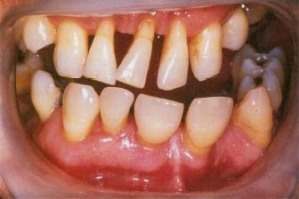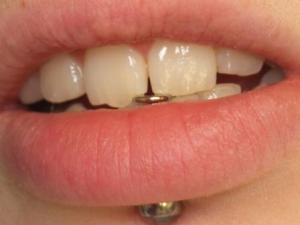Hypothetically, Zombies and their health
If your local zombies were to get an oral exam, what health problems do you think would be manifesting?
From Dr. Mendieta’s limited knowledge of zombies, it seems to us at Global Smiles like they are subject to poor wound healing, loss of limbs, loss of teeth and bleeding gums!
All kidding aside, those can be serious manifestations of diabetes and periodontal disease. Diabetes mellitus is a metabolic disorder characterized by hyperglycemia due to defective secretion or activity of insulin. The complications of diabetes are related to long-term elevation of blood glucose concentrations (hyperglycemia). Hyperglycemia results in the formation of advanced glycation end products (AGEs).
The classic presentation of periodontal disease is associated with accumulation of plaque and calculus that harbors bacteria and potent virulence factors, which lead to destruction of periodontal tissues and resorption of bone around the teeth.
Diabetes and periodontal disease must be controlled because there is some speculation that AGE-enriched gingival tissue has greater vascular permeability, experiences greater breakdown of collagen fibres and shows accelerated destruction of both connective tissue and bone. What these (macro)vascular complications mean is that individuals with diabetes can suffer from coronary artery disease, cerebrovascular disease and peripheral vascular disease. Microvascular complications include retinopathy, nephropathy and neuropathy. Retinopathy may lead to blindness, whereas progressive renal disease can lead to kidney failure. Peripheral neuropathy may lead to loss of limbs.
In terms of oral manifestations, the patient may experience delayed wound healing, candida infection, xerostomia (which lead to dental caries) as well as an increased susceptibility to bleeding gums, and periodontal disease i.e. loss of gum attachment and missing teeth. In fact, one study has shown that diabetic patients are 5 times more likely to be missing teeth.
Control of periodontal infection in diabetic patients reduces the level of AGEs in the serum. Here is what you can do:
- Brush and floss regularly
- If you have or suspect you have diabetes or periodontitis find a dentist and a physician for preventive care.
- If you have diabetes let your doctor know if you have noticed any signs of infection, bad breath, loose teeth, bleeding gums, mouth ulcers, pain, or a bad taste in your mouth.
- Make sure you see your dentist for periodic dental and periodontal examinations (every 6 months or more frequently) as recommended by the American Dental Association.
Global Smiles Orthodontics would like to thank Debora C. Matthews, DDS, Dip Perio, MSc head, division of periodontics, Dalhousie University, Halifax, Nova Scotia and the University of NC and Univ. of Michigan (Southerland, Taylor and Offenbacher) for their research.





